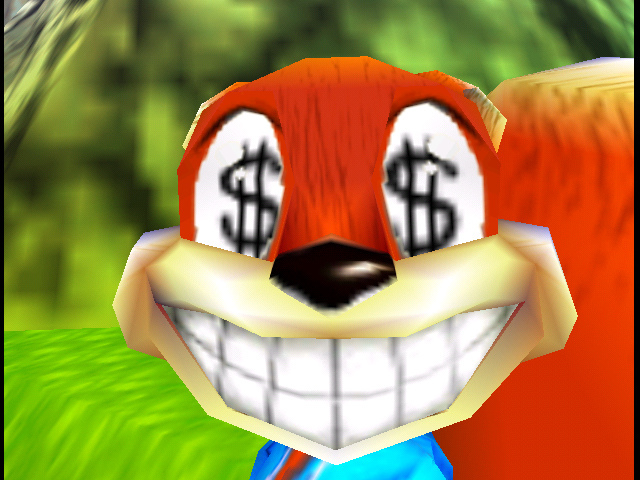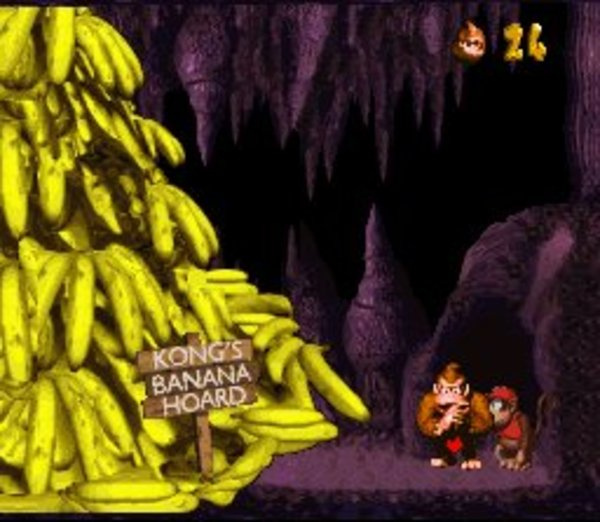In-game economies, once a matter of double-checking that the 10HP potion costs no more than half the 20HP potion, have evolved into the real things. Developers are finding more ways for players to connect with each other in game worlds that are turning into platforms for the continuous introduction and sale of new content. Gamers buy, sell, and exchange in markets dictated by real market forces, leaving showrunners with the unenviable task of managing a living economy in such a way as to meet profit goals and maintain the delicate balance of mechanics that keeps their finicky players from abandoning them for one of their hundreds of competitors.
It's really complicated. So instead, let's just talk about Rare's N64 games.

(Minor spoilers for "Conker's Bad Fur Day" ahead. And I guess "Conker: Live and Reloaded" too.)
Conker's Bad Fur Day. A delightful send-off to the post-Mario 64 3D platformer golden age of the last half of the 90s. It's a cool, rarely-seen parody game, subverting Rare's typical cutsey character designs and ending with a boss defeated by swinging him around by the tail. The game's only real collectible is cold, hard cash. And I wonder: is this a way for Rare to pick on the most loathsome variety of 3D platformer, the collectathon?
Let's contrast to Rare's own Donkey Kong 64. DK64 is the game often tauted as codifying and killing the collectathon, that genre of platformer in which gathering up floating trinkets is an end in itself. With DK64, Rare made a 3D platformer of a scope never seen before, and that's where they stumbled. DK64 features five characters, enormous worlds, and more trinkets to collect, in terms of variety and volume, than any platformer past. The biggest problem is that many of those collectables, such as the all-important banana, are segregated by character; Donkey Kong can't pick up bananas earmarked for the other four characters, and vice versa. Bananas allow you to unlock new levels and progress through the game, so advancing requires, under ideal circumstances, five fairly thorough cumulative scroungings. Whatever fun lies in the objective-based puzzle platforming is counterbalanced by the tedium of joylessly trudging through massive levels, and, at least in retrospect, the latter outweighs the former.
In Donkey Kong's case, bananas are more than just trinkets that arbitrarily unlock a series of doors. They're not Mario 64's stars, a mere means to rescuing the princess, discarded before the start of the next game. When Donkey Kong picks up a banana, he's reclaiming one of his own prized posessions, stolen from his (increasingly negligently unguarded) Banana Hoard. I don't think he even eats them; the same Hoard, the same bananas, are stolen over and over again throughout the series. Structurally and narratively, Donkey collects bananas to own bananas.

Come on, those'll go bad before he could POSSIBLY eat them all!
(Sure, there's often enough a relative that needs saving while he's out, but I have my doubts that DK would even get out of bed if his bananas weren't missing too.)
Now, back to Conker. Conker features some massive worlds, a by-product of its early days as a typical Rare platformer, but quickly leads you through them in an almost Half-Life-esque manner. The game whisks you from challenge to challenge, giving you new, challenge-specific abilities with which to solve them. It aims to give you the fun parts of platformers like DK64, the objective-based puzzle platforming bits, without putting them behind a wall of collecting, unlocking, and backtracking. It's a much tighter, more streamlined experience. As such, it's impossible not to find every dollar; the game naturally leads you to every wad of cash.
 The money comes in these anthropromorphized, verbally-abusive wads. While you only get a suspicous feeling of malice on the developer's part when you're digging for more trinkets in a standard collectathon, the collectibles in Conker actively insult and berate you. Conker accumulates more and more of the green stuff as the game progresses, eventually busting a bank vault's worth and becoming King of the Game. But Conker's girlfriend dies in the robbery, and he realizes that his new status is hollow and disappointing. It's as if Mario kept the stars and lost the princess. Conker's essentially "achieved" a 10X% completion score, but so what? What does he have? As he himself eulogizes, "I may be king and have all the money in the world, and all the land, and all that stuff, but, you know, I don't really think I want it."
The money comes in these anthropromorphized, verbally-abusive wads. While you only get a suspicous feeling of malice on the developer's part when you're digging for more trinkets in a standard collectathon, the collectibles in Conker actively insult and berate you. Conker accumulates more and more of the green stuff as the game progresses, eventually busting a bank vault's worth and becoming King of the Game. But Conker's girlfriend dies in the robbery, and he realizes that his new status is hollow and disappointing. It's as if Mario kept the stars and lost the princess. Conker's essentially "achieved" a 10X% completion score, but so what? What does he have? As he himself eulogizes, "I may be king and have all the money in the world, and all the land, and all that stuff, but, you know, I don't really think I want it."
Have you ever felt that way at the conclusion of a particularly exploitative collectathon?
VentureBeat's mission is to be a digital town square for technical decision-makers to gain knowledge about transformative enterprise technology and transact. Learn More
